Egypt Travel Tips: Everything You Need to Know
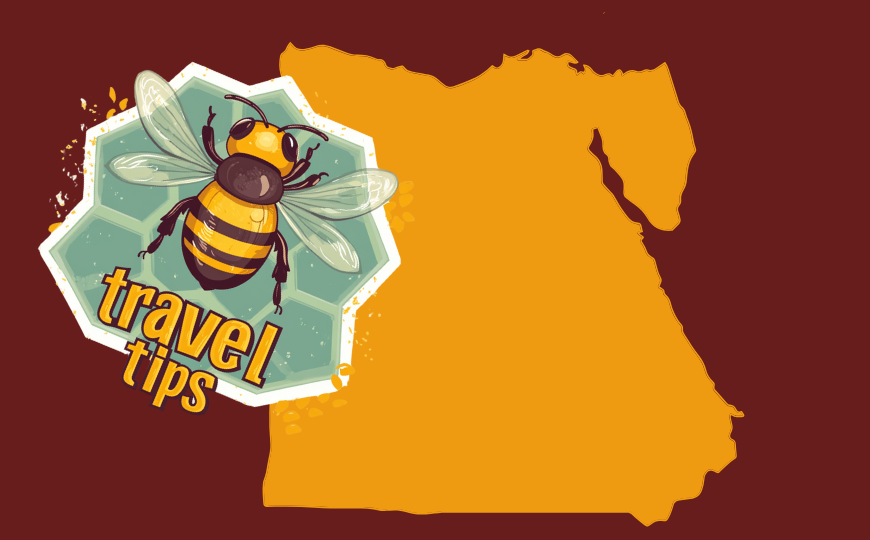
Egypt travel tips to make your Egyptian holiday easier, safer and more enjoyable. Travel Basics includes information every traveler ought to know. Cultural Tips help explain why they do things a certain way, and Stay Safe will help keep you out of trouble.
Travel Basics: Know Before You Go
Visa requirements are determined based on your passport country. Most ordinary USA passport holders may obtain an entry visa for visits up to 30 days through the Arab Republic of Egypt Electronic Visa Portal. Please be sure to consider your travel plans to determine what kind of visa you need, as there are different applications for single or multiple entry, etc. If you traveling with Worker Bee Tours, please contact us and we will be happy to help.
Please check the passport validity requirements for your passport country and type before purchasing your e-visa, since they are non-changeable and non-refundable once issued.
More information is available from the Egyptian Ministry of the Interior on their Frequently Asked Questions page.
Egypt uses time zone UTC+2, and refers to its time zone as Egypt Standard Time (EGY), which is equivalent to Eastern European Time (EET) when daylight saving time is not in effect. During the summer months, Egypt observes Eastern European Summer Time (EEST), which is UTC+3. Generally speaking, Egypt observes summer time between the last Friday in April and the last Thursday in October.
Egypt’s climate varies significantly across its regions, influenced by its vast deserts, the Mediterranean coast, and the Nile River. Its diverse geography means that while some regions experience extreme heat, others remain relatively mild, making it a year-round destination with varying climates to suit different preferences. Here’s a seasonal breakdown:
Spring (March–May)
Spring in Egypt brings mild temperatures, but it is also the season of the Khamsin winds, which can cause sudden spikes in heat and sandstorms. In Cairo and the north, temperatures range from 24°C to 32°C, with occasional breezes from the Mediterranean. The Western Desert experiences dry, warm conditions, while the Nile Valley enjoys a gradual warming, making it a pleasant time for river cruises. In Sinai, particularly in the mountainous south, temperatures remain cooler, offering comfortable hiking conditions.
Summer (June–August)
Egyptian summers are intensely hot, especially in the Western Desert, where temperatures can exceed 45°C. Cairo and the north experience high humidity due to their proximity to the Mediterranean, making the heat feel even more oppressive. The Nile Valley, including Luxor and Aswan, sees scorching temperatures above 40°C, with little relief from shade. Sinai’s coastal areas, such as Sharm El-Sheikh, remain slightly cooler due to sea breezes, making them popular summer destinations.
Autumn (September–November)
Autumn brings gradual cooling, making it one of the best times to visit Egypt. Cairo and the north experience pleasant temperatures between 22°C and 30°C, with reduced humidity. The Western Desert remains warm but more bearable, while the Nile Valley sees a drop in daytime heat, making outdoor exploration more comfortable. Sinai, particularly its mountainous regions, begins to cool significantly, offering crisp evenings and ideal conditions for trekking.
Winter (December–February)
Winter is Egypt’s coolest season, though temperatures remain mild compared to many other countries. Cairo and the north see temperatures between 10°C and 20°C, with occasional rain along the Mediterranean coast. The Western Desert experiences chilly nights, sometimes dropping close to 0°C, while the Nile Valley remains warm during the day but cools significantly at night. Sinai’s mountains, including St. Catherine, can experience sub-zero temperatures, even occasional snowfall, making it a stark contrast to the rest of the country.
Egypt boasts a rich linguistic tapestry that reflects its vibrant cultural heritage. While Modern Standard Arabic is the official language used for government, media, and formal communications, everyday conversations across the country are dominated by Egyptian Arabic, affectionately known as Masri. In bustling Cairo, along the Nile, and in tourist-friendly hubs, you’ll hear this warm, expressive dialect, which has shaped Egypt’s identity for centuries. Regional variations also add to the cultural mosaic—Sa’idi Arabic echoes in Upper Egypt’s rural expanses, the Berber-derived Siwi language whispers from the Siwa Oasis, and Coptic remains a cherished relic in religious and cultural practices.
Egypt travel tip: Egyptian Arabic for Beginners Language Chart
For travelers, making a modest effort to engage with Egypt’s linguistic diversity can turn a simple visit into an immersive cultural experience. Starting your interactions with a friendly “Salam Alaikum” (peace be upon you) is a wonderful icebreaker that locals appreciate. While English is commonly understood in major tourist areas like Cairo and popular resort spots in Sinai, learning a few basic Arabic phrases or using a translation app goes a long way in markets and meals away from the usual tourist routes. This gesture of respect can help you build genuine connections and unlock the deeper stories and traditions that make Egypt such a captivating destination.
The official currency of Egypt is the Egyptian pound (EGP), typically represented by the symbol E£ or the abbreviation LE. Banknotes are issued in denominations encompassing 1, 5, 10, 20, 50, 100, and 200 pounds. One Egyptian pound is subdivided into 100 piastres. Coins circulate in smaller denominations such as 5, 10, 25, and 50 piastres, with a 1-pound coin also in use on occasion.
In a significant move towards modernization, the Central Bank of Egypt has introduced new polymer banknotes for the 10 and 20-pound denominations. These polymer notes feature advanced security elements—such as detailed holograms and tactile marks for the visually impaired—as well as improved durability and hygiene compared to their traditional paper counterparts. Both the older paper banknotes and the newer polymer notes are accepted as legal tender.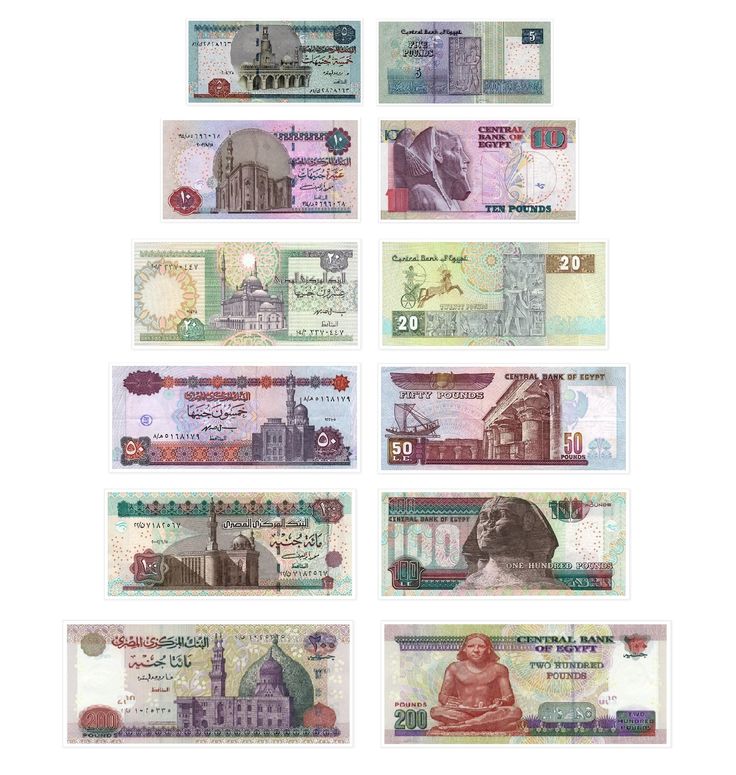
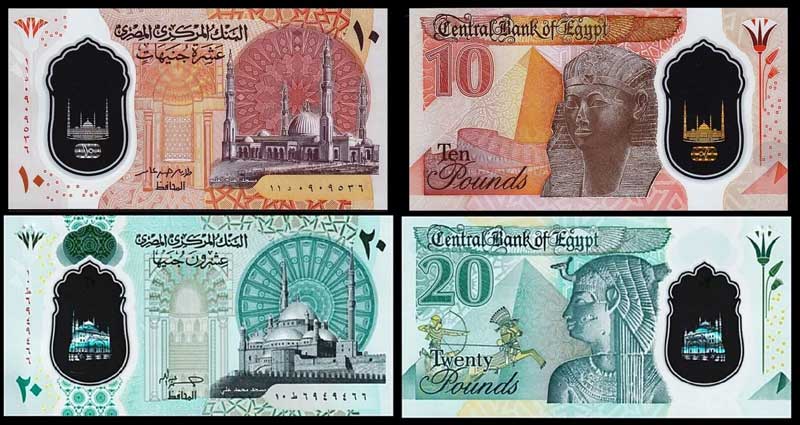
Special Egypt travel tip: Always be sure to have small denomination banknotes with you to use for baksheesh, small sums of money paid out as tips to people who help you out on the streets and at tourist sites.
You can check the current exchange rate for Egyptian pounds against other currencies here.
ATMs are widely available in Egypt. You can use a Visa or Mastercard debit card, credit card or travel card to get cash from Egyptian ATMs. All ATMs offer you a choice of languages including English and sometimes other languages. Some ATMs give you the choice of withdrawing Egyptian pounds or other currencies.
The maximum amount you can withdraw from an Egyptian ATM will largely depend on your bank. Each bank usually has its own daily, weekly and/or monthly withdrawal limits. ATMs in Egypt also tend to have individual withdrawal limits of between 20,000 and 30,000 EGP.
The safest and most convenient way to pay in Egypt is by credit or debit card, which are accepted in almost all hotels, shops and restaurants. Nevertheless, it is a good idea to have some local cash on hand for small purchases, street snacks, and bazaar haggling.
Egypt uses two associated plug types C and F. Plug type C is the plug which has two round pins and plug type F is the plug which has two round pins with two earth clips on the side. Egypt operates on a 220V supply voltage and 50Hz.
See the illustrations for reference: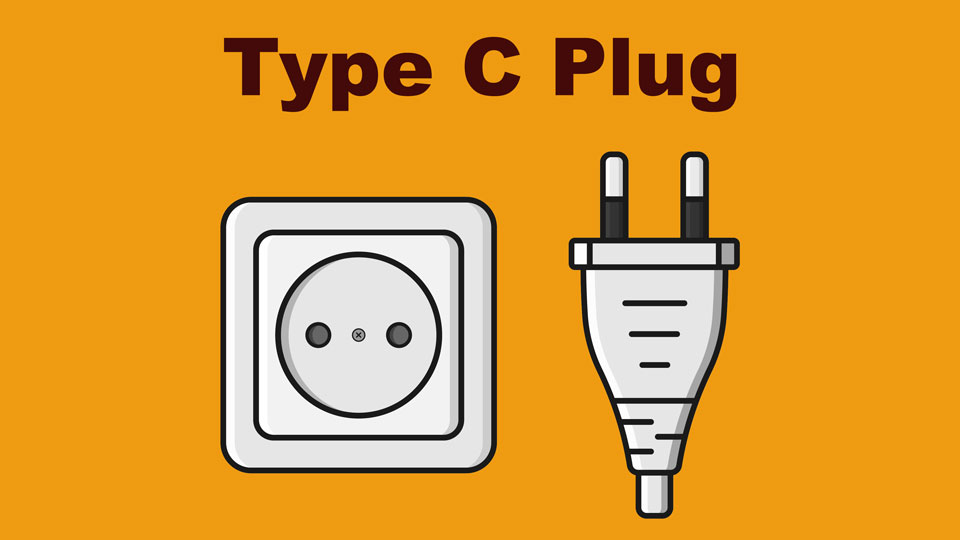
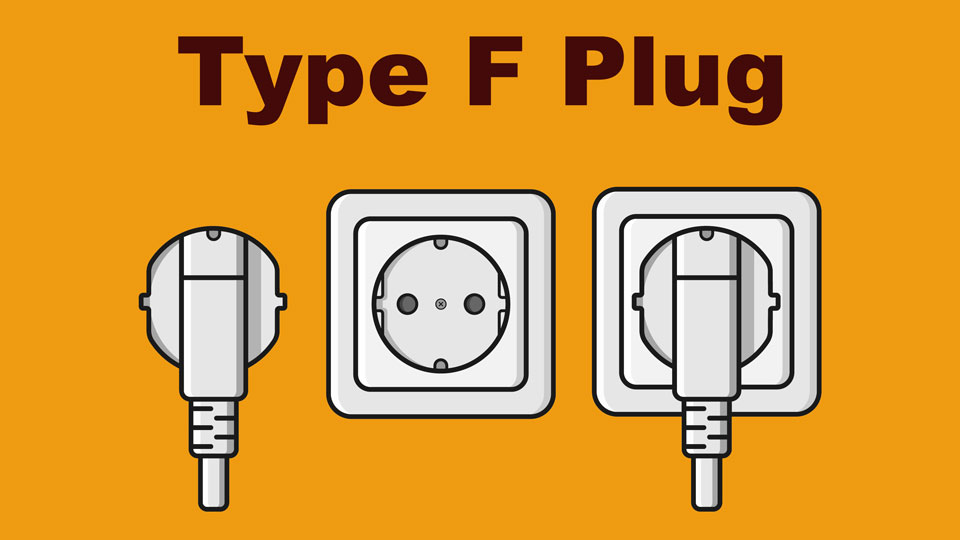
The country code for Egypt is 20. From your mobile phone, reach an Egyptian telephone number by dialing +20 ahead of the area code and the local number. When dialing internationally, remember to omit the leading 0 that typically appears at the beginning of the area code.
Prepaid SIM cards are readily available for use in unlocked mobile phone handsets across Egypt. To purchase one, you’ll need to show your passport as identification. Once activated, these prepaid SIM cards can be used for up to 120 days on foreign handsets, ensuring that you remain connected throughout your stay.
Important Telephone Numbers:
Ambulance: 123
Fire: 180
Police: 122
WiFi Internet access is common throughout Egypt. In major hubs like Cairo International Airport, train and bus stations, museums, and various public spaces, you’ll often find free WiFi available for travelers. Registration is typically quick and straightforward, although the speed and reliability of these connections can vary depending on the location and time of day.
In addition to public hotspots, many hotels, restaurants, and cafes offer complimentary WiFi to guests, though some hotels might charge for high-speed options. For uninterrupted connectivity during your stay, consider purchasing a prepaid SIM card from one of Egypt’s local mobile operators or signing up for an international data package from your home service provider.
Egypt’s Internet country code top-level domain is .eg.
Cultural Tips: A Little Bit of Consideration Goes a Long Way
Egyptians are renowned for their warm and welcoming demeanor, and greetings play a pivotal role in their daily interactions. Whether you’re meeting someone for the first time or catching up with an old friend, opening with a friendly “Salam Alaikum” (peace be upon you) is a great way to show respect and friendliness. In group settings, it’s customary to greet the oldest or most senior person first, underscoring the high value placed on respect and hospitality. When shaking hands—which is typically done with the right hand—maintain eye contact and offer a sincere smile to set a positive tone for your interaction.
In more informal settings, once the initial greeting has been exchanged, you might notice that Egyptians take the opportunity to ask about your wellbeing or family as a way of establishing rapport. While a simple handshake is standard, in closer relationships, you might experience a warm embrace or even a light kiss on the cheek. If you’re uncertain about the level of formality required, it’s wise to let your host lead the way, mirroring their style of greeting. Embracing these nuances of Egyptian greetings etiquette can enhance your interactions and help you form meaningful connections during your visit.
Nonverbal communication is an integral part of Egyptian culture, with hand gestures conveying warmth, respect, and sometimes even subtle social cues during everyday interactions. As you explore Egypt, you’ll notice that many gestures are used to emphasize greetings or express approval, while others might carry unintended negative connotations if misunderstood. Knowing what’s what is always useful.
Here’s a list of some common Egyptian hand gestures along with their meanings:
Right-Hand Handshake:
A standard greeting in Egypt, the handshake is typically performed with the right hand. It expresses respect, trust, and friendliness in both formal and informal encounters.
Cheek Kiss or Embrace:
Among close friends and family, a light kiss on the cheek or a warm embrace is common, signifying personal warmth and affection.
Thumbs Up:
This gesture generally conveys approval or that everything is fine. However, be mindful of the setting, as overuse or overly emphatic movements might be misinterpreted in certain contexts.
Fig Gesture (Thumb Between Fingers):
Represented by inserting the thumb between the index and middle finger, this gesture is considered offensive in Egypt. It is typically used to convey insult or disrespect and should be avoided.
Pointing with the Finger vs. Open-Hand Indication:
Directly pointing at someone is viewed as impolite in Egyptian culture. If you need to indicate direction or emphasize a point, it’s more courteous to use an open-handed gesture or point with your whole hand.
Open Palms (Requesting or Emphasizing Honesty):
An open palm gesture, sometimes used when making a request, signals sincerity and transparency. It can also indicate that your intentions are honest during a conversation.
Beckoning Gesture:
A gentle, downward sweeping motion with the hand is commonly used to invite someone to come closer. This gesture, often informal and friendly, may vary slightly between regions.
Finger-on-Lips (Sign for Silence):
Similar to many cultures, placing a finger on the lips in Egypt is a request for quiet or to signal that a moment of silence is needed.
Understanding these gestures and their meanings can enrich your interactions as you travel, helping you connect more deeply with the locals while ensuring clear communication. Remember that context is key—what is acceptable in one setting might not be in another—and when in doubt, observe and mirror the behaviors around you.
Egypt is a country deeply rooted in tradition and conservative values, which means that public displays of affection are generally kept to a minimum. While a subtle hand-hold or a gentle touch is usually acceptable, overt expressions—such as passionate kissing or prolonged embraces—may be frowned upon, particularly in more traditional or rural areas. Even in progressive urban centers like Cairo, couples tend to keep physical gestures discreet, reflecting the local cultural norms.
For a respectful and pleasant experience, it’s best to reserve more intimate expressions of affection for private settings, such as hotel rooms or quiet spots away from crowded public places. Exhibiting restraint in public not only shows your respect for Egypt’s cultural values but also helps you integrate more comfortably with local customs, ensuring that your interactions remain positive and culturally sensitive throughout your visit.
Most mosques are open to the public daily. They usually welcome visitors, but non-muslims should not enter the mosque during regular Friday services.
When visiting a mosque:
Dress modestly. For men, that means long trousers and covered shoulders. Likewise women must dress with shoulders and knees covered, and don a head scarf as well.
Remove your shoes and leave them at the entrance. Retrieve them when you exit. There are often designated racks onto which to drop your shoes.
If non-muslim, do not enter during prayer times. Consult the daily prayer timetable for details.
Haggling in Egypt is more than just a means to get a better price—it’s an engaging, cultural experience that reflects the vibrant spirit of local markets. When you enter a bazaar, start by greeting the vendor warmly with a “Salam Alaikum” and a friendly smile. Expect that the initial price offered is open to negotiation. Begin by offering a price significantly lower than the quoted amount, keeping in mind that vendors anticipate a counteroffer. Approach the process with patience and good humor; remember that haggling is a dialogue and a shared cultural interaction rather than a confrontational bargaining battle.
As you negotiate, maintain a respectful and courteous demeanor throughout. Show genuine interest in the items, but avoid appearing overly eager, which might make it harder to get a lower price. It’s also wise to have small notes or coins on hand, as this makes transactions smoother and signals that you’re well-prepared. If the price doesn’t come down to a satisfactory level, don’t hesitate to walk away—often, vendors will call you back with an improved offer. Ultimately, embracing the art of negotiation with a light-hearted and respectful attitude will not only help you secure a fair deal but also enrich your cultural experience in the bustling markets of Egypt.
Tipping in Egypt, often referred to as “baksheesh,” is both allowed and encouraged as a means of showing appreciation for good service. While it is not legally required, tipping is widely expected by service providers—from restaurant staff and hotel employees to taxi drivers and tour guides—who often depend on these additional earnings. Even a small token of thanks is appreciated, as it not only acknowledges excellent service but also helps supplement the modest wages of those working in the tourism and hospitality sectors.
The amount you tip can vary depending on the service and context. In restaurants, if a service charge is not already included in your bill, a tip of around 10-15% is customary. For taxi rides, rounding up to the nearest convenient amount is common practice. Hotel staff, such as porters or housekeeping, typically receive between 5 to 20 Egyptian pounds per service. For tour guides and drivers, consider offering between 20 to 50 pounds per person, adjusting upward if their service is exceptionally attentive or involves an extended day of work. By tipping appropriately, you not only show respect for local customs but also contribute positively to the local economy.
In Egypt, alcohol consumption is legal and commonly available in major cities, tourist areas, hotels, and licensed restaurants, but it is wise to exercise discretion, especially in conservative or rural settings where public drinking may be frowned upon. When consuming alcohol, do so in designated venues and avoid excessive behavior that could be seen as disruptive or disrespectful of local customs and religious sensibilities, as many Egyptians prefer moderation in such matters.
Similarly, while smoking is prevalent and legally permitted, be mindful of local regulations: many public indoor spaces such as restaurants, offices, and public transport have restrictions against smoking, so watch for no-smoking signs and stick to designated smoking areas. Whether enjoying a traditional hookah session in a café or simply having a cigarette, respecting the cultural context and local laws will ensure you have a comfortable and appreciative experience during your stay in Egypt.
Stay Safe: Do’s and Don’ts While Traveling in Egypt
Egypt is generally considered a safe country for tourists, especially in popular destinations such as Cairo, Luxor, Aswan, and the Red Sea resorts like Sharm el-Sheikh and Hurghada. These well-established tourist hubs benefit from stringent security measures and frequent patrols by local authorities, ensuring that visitors can explore world-famous historical landmarks and vibrant cityscapes with relative peace of mind. However, like many travel destinations, it’s important to exercise common sense, remain aware of your surroundings, and stay informed about the current local situation.
That said, certain regions in Egypt warrant extra caution. Areas in North Sinai and along the borders with Libya are known to experience higher security risks, including occasional terrorist activity and military operations, and are generally advised against for non-essential travel. To ensure a smooth trip, avoid venturing into these high-risk areas and always check the latest travel advisories from reputable sources before planning excursions beyond the main tourist circuits. By staying informed and taking sensible precautions, you can enjoy a rewarding and secure experience in Egypt.
When traveling in Egypt, it’s important to stay alert in crowded areas like markets, tourist sites, and on public transportation where pickpocketing can occur. Keep your valuables secure by using a zippered bag or a money belt that fits under your clothing, and avoid flashing expensive jewelry or large sums of cash. Be cautious of overly friendly strangers who may try to distract you, and always secure your belongings when seated in public places like cafes or taxis. Taking these simple precautions will help ensure that your experience remains both enjoyable and incident-free.
Safeguarding your health and hygiene while traveling in Egypt begins with being mindful of your dietary and water consumption habits. Since tap water in Egypt isn’t considered safe for drinking, it is best to consume only sealed bottled water and avoid beverages with ice from unreliable sources. When sampling the diverse cuisine—from local street food to meals at bustling restaurants—opt for establishments that appear clean and are popular with tourists or locals alike. Carrying hand sanitizer and practicing regular handwashing, especially before eating, helps minimize the risk of foodborne illnesses. It’s also wise to bring along any necessary medications and consult a travel health professional prior to departure for tailored vaccination and health advice.
Given Egypt’s hot and often arid climate, protecting yourself from the sun is crucial. Wear a wide-brimmed hat, sunglasses, and high SPF sunscreen, and stay well-hydrated by drinking plenty of fluids throughout the day. In crowded outdoor markets or when exploring ancient ruins, take breaks in shaded or air-conditioned areas to avoid heat exhaustion.
By following these simple steps—choosing safe food and drink options, maintaining personal hygiene, and protecting yourself from the elements—you can ensure a healthier, more enjoyable travel experience in Egypt.
Egypt’s political landscape can be a sensitive subject, and engaging in political discussions—even casually—can sometimes attract unwanted attention or lead to misunderstandings. Political opinions tend to evoke strong feelings, and due to Egypt’s complex history and current climate, even seemingly benign comments may be misconstrued. As a visitor, it is wise to be cautious and avoid delving into contentious political issues, especially in public or mixed company, where debates might inadvertently become heated. This cautious approach not only helps steer clear of potential conflicts but also shows respect for the local sentiment surrounding such subjects.
Conversely, refraining from political debate allows you to focus on the rich cultural, historical, and social aspects that make Egypt so captivating. By keeping conversations on neutral topics like travel experiences, food, art, or historical sites, you’ll foster a more positive rapport with locals who appreciate discretion and sensitivity around political matters. This respectful approach not only ensures that your interactions are pleasant and uncontroversial but also lets you immerse more fully in the everyday life and traditions that define Egyptian culture.
It almost goes without saying, but another important Egypt travel tip is to avoid wandering into or participating in demonstrations, protests, or public disturbances while in the country.
Drinking and driving in Egypt is not only illegal but also extremely dangerous. Egyptian law enforces a blood alcohol concentration (BAC) limit of 0.05%, and any amount of alcohol that pushes you above this threshold can leave you facing severe penalties, including hefty fines, license suspension, or even imprisonment if your actions result in an accident or injury. The risk of impaired judgment and slower reaction times after drinking is significant, and local authorities actively enforce these regulations via checkpoints and traffic patrols.
For your safety and to comply with local laws, it’s best to avoid driving if you plan on consuming alcohol. Instead, arrange for alternative transportation—such as a taxi, rideshare service, or designated driver—to ensure you and others on the road remain safe. By choosing not to drive after drinking, you not only protect your own well-being but also contribute to a safer driving environment for everyone in Egypt.
Egypt enforces extremely strict drug laws, and engaging in the purchase, sale, or use of illegal drugs can lead to severe legal consequences. Even small amounts of banned substances can result in harsh penalties, including long prison sentences, hefty fines, and significant disruptions to your travel plans. Local authorities maintain a zero-tolerance policy, and foreigners caught with illegal drugs often face immediate arrest and extensive legal proceedings. It’s essential to steer clear of any involvement with substances that are not legally permitted.


